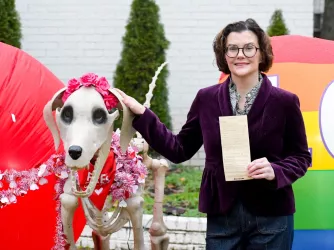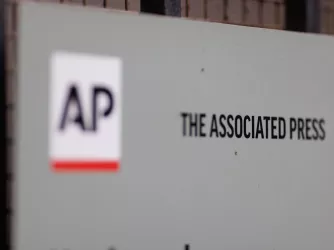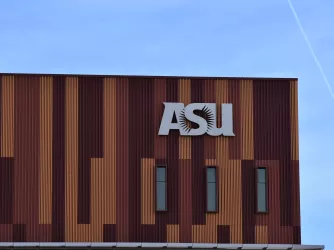Table of Contents
Political Speech on Campus Threatened In and Out of Election Season

Since the start of the academic year, students across the country have been engaging in free speech by taking part in the political process and supporting their candidates of choice. The candidates have been able to speak their minds this election cycle, but that hasn’t always been the case for students trying to express their opinions about the election on their college campus.
Today, during Free Speech Week and at the peak of the election cycle, FIRE highlights cases involving political speech to bring awareness to the censorship such speech faces on American college campuses.
Although political speech is at the core of the First Amendment’s protections, administrators at many public colleges have attempted to censor or restrict this type of speech. Iowa State University (ISU) and the University of Missouri (Mizzou) are two public institutions that have tried to limit student political speech in recent years—specifically speech on t-shirts advocating for marijuana legalization.
In 2012, the National Organization for Reform of Marijuana Laws (NORML) chapter at ISU received university approval for a group t-shirt that featured the ISU mascot and the text “NORML.” After criticism from the public and state officials, the university rescinded approval for the t-shirt and adopted new regulations to prevent NORML ISU from engaging in political advocacy.
ISU rejected NORML ISU’s next set of t-shirt designs, claiming they associated the ISU name with promotion of “dangerous, illegal or unhealthy products, actions or behaviors” and “drugs and drug paraphernalia that are illegal or unhealthful.” NORML ISU sued ISU for violating its free speech rights, and, in January 2016, a federal judge ordered ISU to allow the group to print t-shirts depicting a marijuana leaf with the school's name or logo.
Apparently Mizzou didn’t get the memo about what happened to ISU when it censored its campus NORML chapter. In the fall of 2015, the Mizzou chapter of NORML sought to sell t-shirts to raise money for the chapter and raise awareness of marijuana policy issues. Mizzou rejected all of the proposed designs because of their “drug-related imagery, specifically the cannabis leaf.” FIRE wrote to Mizzou twice and published a national press release warning the university that it was violating the First Amendment by rejecting Mizzou NORML’s t-shirts because it disagreed with the group’s viewpoint.
Censorship of political speech isn’t just an issue at public universities either. Private colleges have been doing their fair share of restricting political expression and, as FIRE frequently notes, although private schools aren’t bound by the First Amendment, many promise free speech and expression on campus. If free speech is promised by a private college or university, that promise includes political speech, and by censoring this type of expression the college is violating its moral (and possibly legal) obligations. In the past year, Georgetown University Law Center (Georgetown Law), American University (AU), and DePaul University have all made efforts to suppress political speech.
Georgetown Law and AU both censored political speech during the 2016 presidential primary using their tax-exempt, 501(c)(3) status as an excuse. In the case of AU, the university wouldn’t allow Students for Rand—a group supporting Rand Paul’s candidacy—to become an official student organization because of AU’s tax-exempt status. AU then censored the group for clipboarding in support of Paul’s campaign in the campus quad because doing so was prohibited by the school’s solicitation policy. FIRE wrote to AU, and the school responded with a commitment to allow partisan political groups to gain official recognition.
A group of students campaigning for Bernie Sanders was the target of censorship from Georgetown Law. There, students tried to table with Bernie Sanders materials and were told by a Georgetown Law official that this violated the law school’s tax-exempt status. FIRE wrote Georgetown Law and issued a national press release, which led to a congressional hearing about colleges’ 501(c)(3) status. At the hearing, Professor Frances Hill, a tax expert from the University of Miami School of Law, made it clear that a university’s tax-exempt status does not apply to students. Georgetown Law eventually revised its policy related to political speech.
At DePaul, just about all political expression has been under attack. This past spring, chalkings supporting Donald Trump at a number of schools resulted in controversy, and DePaul responded particularly poorly with a ban on political chalking. Like Georgetown Law and AU, DePaul used its 501(c)(3) status as an excuse to censor the College Republicans’ chalk messages about Trump.
DePaul didn’t stop there. The university also charged the DePaul Socialists, Young Americans for Freedom (DYAF), and the College Republicans with exorbitant “security fees” for trying to exercise their free speech rights. DePaul told the DePaul Socialists they would need to pay for security for their fall launch meeting because of the “controversial nature” of the issues that would be discussed. DYAF and the College Republicans sought to host speakers on campus and were told they would need to hire security—something that would cost hundreds of dollars. FIRE wrote to DePaul twice and issued a national press release demanding that it honor the promises of free speech it makes to its students and stop inflicting a “speech tax” on student organizations based on the perceived controversial content of their events.
Political speech is at the heart of American democracy. Instead of turning to censorship, colleges and universities should encourage students to engage in the political process.
Recent Articles
FIRE’s award-winning Newsdesk covers the free speech news you need to stay informed.

LAWSUIT: Tennessee town cites woman for using skeletons in holiday decorations

White House barring AP from press events violates the First Amendment

FIRE opposes Virginia’s proposed regulation of candidate deepfakes
